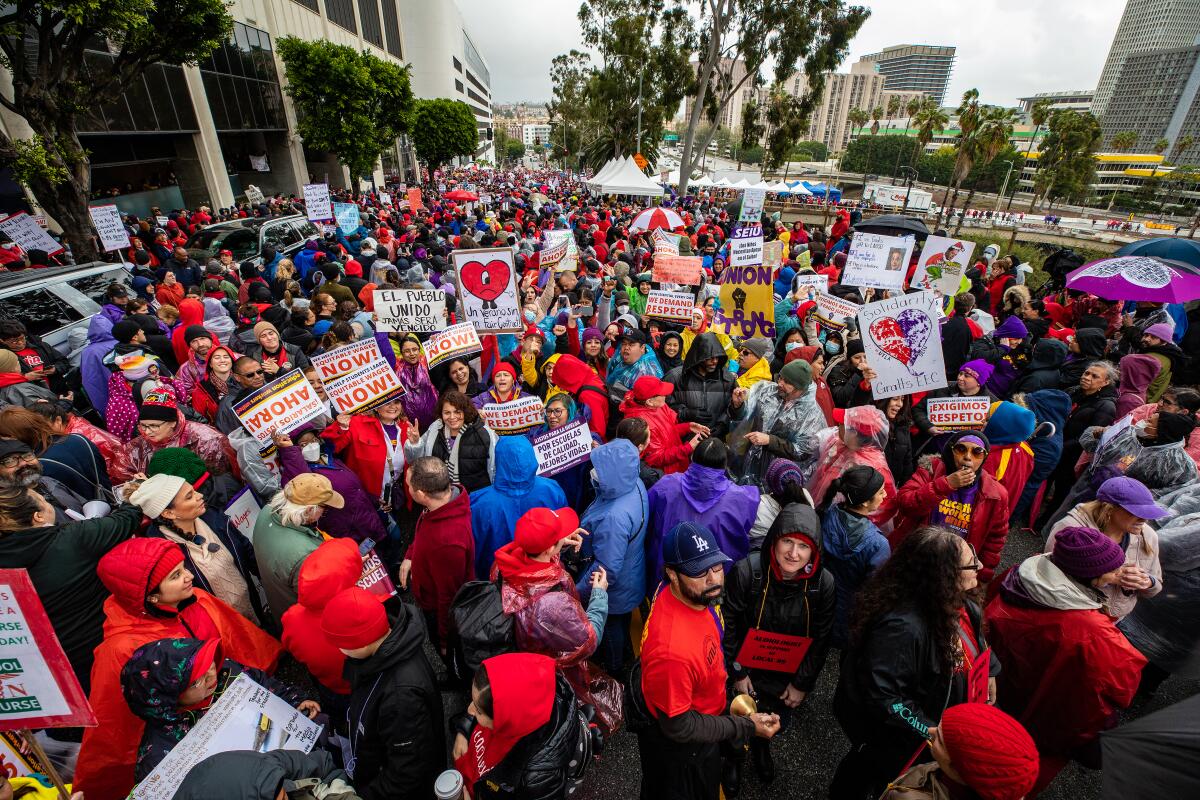Editorial: Who says L.A.’s mayor doesn’t have power over schools?

- Share via
Los Angeles mayors have no official authority over local schools, but they have a big stake in their success. And the kind of political capital that can make people listen.
For that reason, Los Angeles was fortunate that Mayor Karen Bass stepped up last week to mediate a labor impasse between the Los Angeles Unified School District and 30,000 low-wage workers that shuttered schools for three days.
Talks between the district and Service Employees International Union Local 99, which represents cafeteria workers, custodians, bus drivers, teacher assistants, after-school program workers and gardeners, had broken down in this month over the size of pay raises and other issues. Many of these employees are part-time and earn on average $25,000 a year. When SEIU members went on strike last week, they were accompanied by most of the 35,000 members of United Teachers Los Angeles, who walked out in solidarity.
The school district had prepared in advance for the disruption by preparing study packages for students to take home and provided free breakfasts and lunches for three days. But the closures still sent parents scrambling for day care during the three days and were a setback for students who have a lot of ground to make up after the pandemic.
Perhaps taking a cue from her predecessor Mayor Eric Garcetti, who helped negotiate the end to a contentious teachers strike in 2019, Bass said she called both parties about a week before the strike to offer her mediation help and the use of city parks and other buildings for food distribution and child supervision. On Thursday, Bass declined to give many details about her work at the bargaining table, saying, “I’m facilitating the discussions back and forth. When you’re at this stage, it’s very fragile.”
Union officials described Bass’ involvement as instrumental, and district officials expressed appreciation of her role.
State Sen. María Elena Durazo (D-Los Angeles), the former head of the L.A. County Federation of Labor, praised Bass for taking leadership in a situation that greatly affected Los Angeles residents. “She could’ve run away from it. She could’ve blamed LAUSD. Instead, she ran to it.”
Negotiations between Los Angeles Unified and the union for low-wage district staff must not fail. The education of 420,000 students is at stake.
The tentative agreement is a big win for the district’s low-paid workers. It calls for raises spread out over a period of time, beginning with retroactive pay raises to July 1, 2021, and ending with a $2-an-hour raise beginning Jan. 1, 2024, averaging about 30%. The updated pay will bring the district’s minimum hourly wage to $22.52, higher than the city of Los Angeles, which will be $16.78 an hour beginning July 1, and the state, which is $15.50 an hour. The amount is more than the $20.76 that LAUSD was offering before the strike.
The agreement also secures health benefits for employees working a minimum of four hours daily, who weren’t already receiving healthcare benefits, including teacher assistants and after-school workers.
The tentative agreement must still be voted on by union members and the LAUSD board, but it’s safe to say that a crisis has been averted — at least until the next labor impasse. That could come soon, as United Teachers Los Angeles is now in contract negotiations. Ideally, the discussions will proceed smoothly, without any need for the mayor to step in. But it’s nice to know that if necessary, Bass is up to the task.
More to Read
A cure for the common opinion
Get thought-provoking perspectives with our weekly newsletter.
You may occasionally receive promotional content from the Los Angeles Times.











